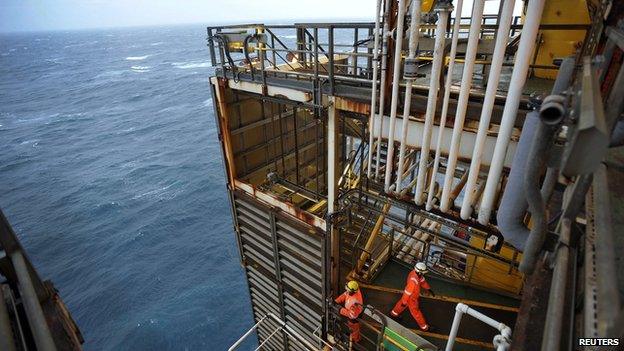Where politics meets statistics
- Published

Oil revenues feature heavily in the interpretations of the projections
Alex Salmond's demeanour was modest, contained and controlled - with the occasional dry quip lobbed in the direction of the wicked media who were questioning him about GERS.
(No, not the outfit who may or may not make it to the cup semi-final to face doughty opponents. We are talking about the Government Expenditure and Revenue Scotland report.)
As Mr Salmond was cheeky enough to note, I have covered every one of these events down the decades.
I recall their genesis as part of an effort by the then Conservative Secretary of State to prove the worth of the UK to Scotland. I recall the intriguing occasion when the Chief Economist, a civil servant, said that the figures, in themselves, said nothing about prospects under independence.
And so I am aware that this publication is, in essence, a political event as well as a statistical one. It has been from the outset and is so now. It is about competitive interpretation rather than a simple sum.
Question of oil
So, judging Mr Salmond's demeanour, supporters of the Union would detect gloom and despondency at an outcome which indicates that oil revenues dried up significantly in 2012/13 while Scotland's estimated net fiscal deficit outpaced that of the UK as a whole, by contrast with previous years.
By contrast, Mr Salmond would say that his attitude was a calm, measured assessment of Scotland's longer term prospects leading to the conclusion that, even without oil, Scotland's onshore economy is resilient and growing; and that, with oil investment buoyant, the North Sea has a big contribution to make too.
Take the oil stats. Scotland's estimated geographical share of oil revenues is down over the single year by some £4.4bn, around 41%.
Mr Salmond's opponents, such as Alistair Darling, say this proves the volatility of North Sea oil - and the folly of founding Scottish economic forecasts on such a variable commodity.
No, says the First Minister. Over a five year period, Scotland is still outpacing the UK as a whole on fiscal balance. Further, the decline in oil revenues represents a strength in another direction.
Mr Salmond says the fall in revenue largely reflects an upturn in capital investment in the North Sea - which can thereby be set against taxation. That investment, he argues, bodes well for the future of the sector and can be expected to generate enhanced revenue in future.
Wider picture
Against that, Mr Salmond's opponents say that North Sea output is, by definition, in long-term decline. Next year, they say, is still likely to be relatively difficult in terms of revenue.
How, they say, would Scotland cope with a cut of £4.4bn in a single year? Say that was Independence Year One? Mr Salmond says that is the very purpose of the stabilisation fund suggested by the Fiscal Commission: work on low forecasts of oil revenue, set aside where possible, iron out tough years.
Which brings us to the wider picture. Mr Salmond's opponents say there is no slack in the system. Scottish expenditure is higher per capita than for the UK as a whole - and now Scotland's net deficit is higher too, because of those declining revenues. Previous claims, based upon a Scottish lead, have evaporated.
Mr Salmond's reply? Even in a bad year for oil revenues, the relative gap with the UK is small at one per cent of GDP. Look, they say, at the overall Scottish GDP, including oil. That figure indicates that Scotland's onshore economy has, to a large degree, coped with and countered the oil drop.
Further, he says that the net fiscal deficit, which includes capital investment, is affected by the Scottish government decision to shift expenditure from revenue to capital in order to grow the economy. A negative indicator, then, reflecting a positive decision.
All things being equal, is this the set of GERS figures the Scottish government would have wanted to take into a referendum? No. But the First Minister and his colleagues remain adamant that they indicate the underlying strength of the Scottish economy together with continuing investment in the North Sea and optimistic prospects.
His opponents dissent, strongly. Your referendum, your choice.
- Published12 March 2014
